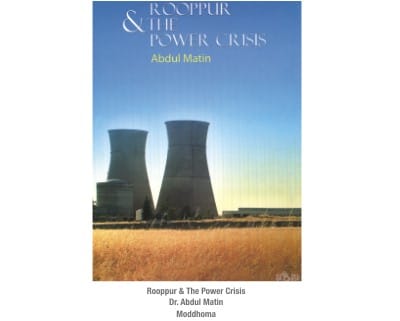Much talked about but never starting

Books on technical matters are a rarity in the annals of Bangladeshi publications. Former Chief Engineer of BAEC and academic, Dr. A. Matin's latest book on Rooppur and the Power Crisis is a timely and valuable addition to this genre.
The book is a collection of the articles that Dr. Matin wrote in the period 2009-2011 in different English language dailies of the country. He covers a large number of issues, namely, Rooppur Nuclear Power Project with particular reference to the current Russian proposal, Fukushima reactor accident in Japan and its lessons for the Rooppur Project, nuclear proliferation issues of our neighbourhood, Bangladesh's perennial crisis of electricity generation and in particular the folly of rental power scheme, electrical connectivity of the South-East Asian nations, renewable energies like solar and wind, climate change etc.
As one associated with the Rooppur Project almost from its initial conception, Dr. Matin is eminently qualified to write on this much talked-about but never-starting project. He explains to the reader in simple language how a nuclear reactor works, why nuclear is a good option for a developing country like Bangladesh, which particular reactor type is suitable for Rooppur, analyses its safety and waste management issues, etc. As for the Russian proposal, it is somewhat disheartening that a series of MoUs have been signed between the two Governments but no solid progress is discernible. We still do not know whether the project at the current site is feasible or how much it will cost and who will finance it.
Japan has just observed the first anniversary of the triple whammy it suffered on March 11, 2011: an unprecedented 9.0 magnitude earthquake triggering a tsunami with a record 40 m waves which in turn triggered a worst case scale 7 nuclear disaster in Fukushima. One year on, Japan is still in shock and awe of what it went through. The rest of the world is taking a breather and assessing its nuclear options. Dr. Matin analyses the sequence of events at Fukushima, suggests how to cope with the hitherto unthinkable nuclear meltdown and finally its lessons for incorporation in any future design for Rooppur Project.
We live in a world where Mutually Assured Destruction (MAD) keeps nuclear weapon states (NWSs) away from using their trump cards. Bangladesh is in close proximity to three nuclear weapon states, namely, India, Pakistan and China. So when we hear rumours of another neighbour (Myanmar) harbouring a desire of acquiring this trump card, it is worrying indeed. As a non-nuclear weapon state (NNWS), what protection do we have? Our Foreign Office may take up Dr. Matin's suggestion of seeking an amendment to the NPT and CTBT to include a provision of collective nuclear security guarantee from the P-5 members of the Security Council to the NNWSs.
Dr. Matin devotes a large portion of his book on the causes of our perennial electric power crisis and how to overcome it. The genesis of this malady takes us all the way back to the birth of our nationover-use of our scarce natural gas resources for power production to the detriment of its other beneficial uses, not developing local capability for exploration and development of gas resources, not utilising the substantial coal reserves available in the country and finally as a last nail in the coffin the recent rush for rental power plants. As early as April 2010, Dr. Matin warned about the non-sustainability of the rental power scheme: high cost of generation, dependence on an imported fuel as unpredictable as oil as regards its supply and price, high subsidy that will be a drain on our economy, etc. The rest is history. Some heads should have rolled by now. Instead of going full scale to develop our high-quality coal resources, the government is now going for high-sulphur, imported coal-based power plants. Energy security cannot be achieved by using imported fuel. And to build such plants close to an ecologically sensitive area as the Sundarbans will bring about an environmental disaster.
The decision to invest in rental power plants using diesel fuel in particular must have been taken on an ad-hoc basis, because it defies any logic. To avoid such ad-hocism, Dr. Matin suggests the use of modern computer based methods of power planning. Such a package called WASP can be obtained from the IAEA, Vienna along with necessary training. PDB engineers can then run and update their plans in a matter of days.
One way to solve our electricity supply problem would be to interconnect all the regional grids with sufficient capacity and tap into the enormous hydro potential of our Himalayan neighbours, Nepal and Bhutan. The author devotes a few articles on this topic. This is a connectivity that can transform the South East Asian region and beyond.
The author's coverage of solar and other renewable energy resources and climate change issues makes one up to date on the latest developments on these topics of vital interest to Bangladesh.
Dr. A. Matin writes in easy, free-flowing English and has a knack of making complex issues understandable to the layman. The book, published by Moddhoma, runs into 193 pages with an attractive cover and top quality printing. It is highly recommended for students, teachers, researchers, policy makers, in fact, anyone dealing with energy planning.

 For all latest news, follow The Daily Star's Google News channel.
For all latest news, follow The Daily Star's Google News channel. 



Comments